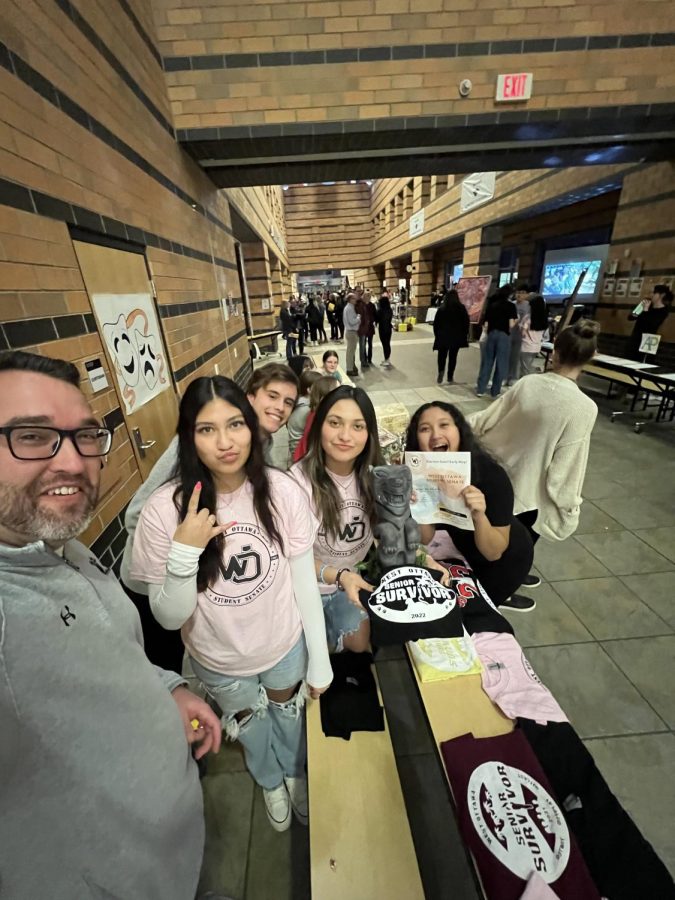Join a club already!
WO students and staff advertising one WO club, Student Senate, at the 8th grade club showcase. (Photo – Kevin Klassen)
May 9, 2023
Not too long ago, the school day didn’t really end at 2:43. Yes, some students left for their buses or cars, but a huge chunk of the student body stayed around to have some fun after the tiring school day.
The students stayed in school to play, advocate, talk, act, sing, and even bake the rest of their afternoon away. In an alarming trend the past few years, students are not joining clubs anymore.
It’s easy to notice. A quick chat with most club advisors is sufficient to understand how club membership has dropped in the past few years. Nate Townsend, a science instructor and advisor for many clubs at West Ottawa, says Drama Club “feels like it’s smaller now than it was before COVID, and marketing doesn’t seem to have had an effect on attendance.” Within the past five years, clubs that once had no problems getting people in the door saw their membership decline or completely vanish. The Young Republicans Club, Multicultural Student Organization, and Cooking Club all shut their doors in just the past year, and their disappearances are symptoms of a nationwide issue.
Clubs, volunteer groups, and other civic organizations have been struggling to attract members for decades. Dr. Pamela Koch, chair of the Sociology Department at Hope College, said, “Volunteering and belonging to community groups has been declining for quite some time. A seminal sociology piece, Bowling Alone by Robert Putnam, came out in 2000 lamenting this fact, and the trend has continued since then.”
More recently, the prevalence of social media has had a profound impact on group membership. Young people are getting their fix of social interactions from hours scrolling through TikToks and Instagram posts, and they don’t feel they need the friendships and fulfilling experiences clubs provide. Koch said, “Young people are spending more time online, and are replacing volunteering and community groups with virtual club group membership.” At West Ottawa, while school-related social media accounts like @barstool_wo are alive and well, students follow them and other accounts in place of in-person group interaction. Ironically, many social media tools intending to drive the school closer together actually do the opposite.
The pandemic exacerbated the larger trend of downward club membership. “Covid-19 made many things online, which amplified the role that social media plays. People can become creatures of habit fairly easily. When volunteering opportunities were on hiatus with Covid-19, many people never returned to the involvement they once had,” Koch said. At West Ottawa, clubs weren’t even allowed to meet in-person from 2020 to 2021, losing an entire year of activity and recruitment. Instructor Brian Taylor shares that one of his clubs, Model United Nations, has had major issues with finding members since the pandemic. “Model United Nations is still rebuilding from the pandemic. Many conferences (competitions) were canceled, and veteran club members have graduated without a similar sized cohort to replace them,” Taylor said. With the pandemic came a year’s worth of lost progress in recruiting new members, and a growing sentiment among students that they don’t really need to join clubs.
The sentiment is tragic because of what students miss. Club involvement can change students’ lives. They forge friendships when kids are spending more time than ever alone on their devices. Townsend said, “The value from being in a club is doing something not school-related, but being able to do it at school. Something fun, something social, after school instead of just going home or wandering the streets. You get to meet new people you otherwise wouldn’t.” Club membership also allows students to feel like they’re making a real difference in the WO community. Jr. Lucia Coipel, who is currently involved in Student Senate, WENOW, and CTEE, said, “I’ve made a lot of friends and felt closer to the community. I feel like I make an impact on the community, which I feel is a hard thing to do as a 17 year-old. Being a part of something and helping people feels really good.”
Club membership also causes future wellbeing. A study from the University of Connecticut showed that people who engage in their communities early in life report less depression and drug use, more acceptance from their friends and family, and increased engagement in physical activity. The effects beginning with joining a club pay dividends for the rest of students’ lives.
There are nothing but positives to club involvement. They improve health, social life, and very importantly, cures the after-school boredom so many students have. To reverse this trend and reap the rewards of joining a club at WO, sign up today! Visit wohsclubs.weebly.com to find a list of every club offered at the school, as well as their websites, meeting times, and other important information. To the students who are comfortable at home and don’t feel the need to join clubs, the message is clear. While leaving comfort zones is scary, the benefits now and for the rest of students’ lives are massive. Going home at 2:43 is the wrong way to get through high school.





